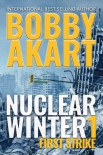Nuclear Winter Devil Storm by Bobby Akart (great novels txt) 📗

- Author: Bobby Akart
Book online «Nuclear Winter Devil Storm by Bobby Akart (great novels txt) 📗». Author Bobby Akart
As a result, the law enforcement arm, together with several investigators, was quickly dispatched to Homestead. The Pentagon considered the destruction of the bridges an act of domestic terrorism, which also made it a matter for the FBI. However, the Justice Department was slow to respond to the Pentagon’s request for agents to assist in the investigation.
That left the task of dealing with the alleged insurrectionists to a criminal investigations special agent who’d been dispatched from Camp Blanding, a military reservation and training base for the Florida Army National Guard located southwest of Jacksonville.
Lieutenant Virgil Robinson was not a full-time member of the Guard. He was also a correctional officer at the nearby state prison located in Starke. A CO for nearly twenty years, he had an unparalleled bullshit meter. Prisoners in maximum security were able to spend their days finely honing their con-man craft. They were able to sense weakness in their captors and fellow inmates. They learned what emotional tools worked and which ones didn’t in a particular situation. They also became adept at lying.
His experience made him an ideal interrogator, and that was exactly what the military police needed with their first two prisoners, Peter and Jimmy.
The guys were taken inside the bowels of the Homestead-Miami Speedway to a Miami-Dade Police department substation, where drunks were held in the event they acted out during a race event. Each was held in a separate cell, awaiting interrogation. They remained in their clothes but were given an MRE ration and a bottle of water. For several hours, they sat alone without any contact with each other. Nor did they encounter any other prisoners.
This unnerved Peter, who became concerned that the military would take out their anger towards Mayor Free and those in concert with her on him and Jimmy. He paced the floor of his cell, constantly looking through the bars toward the long hallway that led to the substation’s offices. He held his breath, focusing his senses to eavesdrop on any conversations that were being held.
The loud clank of the steel locking mechanism shattered the silence as a uniformed guardsman ambled down the hallway past Peter’s cell. The smug man didn’t even glance in Peter’s direction as he made his way to the end of the twelve cells to retrieve Jimmy first. Peter stood at the cell bars and waited for Jimmy to pass him by. The two men stared at one another, and as soon as the guard’s attention was away from Peter, he raised his right index finger to his lips. Jimmy provided his longtime friend an imperceptible nod, indicating he was still on board with the plan.
Hours passed, during which time Peter nervously paced the floor of his six-by-ten-foot cell, which consisted of a concrete slab and a stainless-steel toilet-sink combo. The miniscule amount of ambient light that emanated from the single window providing a glimpse to the outside was insufficient for him to make out his surroundings.
He continued to pace the floor. Every third or fourth trip around the sixty-square-foot space, he stopped at the cell door and listened. It had to be approaching midnight when he finally sat down and tried to make sense of it all.
Where was Jimmy? Why would his questioning take so long if he had nothing to say? Or did they break him? It would mean nothing as far as Peter’s level of complicity was concerned, but it might make it impossible to gain Jimmy’s release. Peter knew enough about martial law to realize the government had the power to lock people up indefinitely, virtually without cause. “Rights,” they’d say. “You ain’t got no stinkin’ rights.”
Suddenly, the same clanging sound he’d heard when the guard arrived earlier brought him back into the present. He scampered back to the cell door and tried to press the side of his face between the bars to get a look at Jimmy.
Another guard had returned without him. Peter didn’t wait to begin peppering the man with questions.
“Where’s the other guy?” he asked as he tried to maintain the façade that the two of them didn’t know each other that well. “Did you let him go? Can I leave now?” His tone of voice reflected his genuine concern. Prisoners feared the unknown and had difficulty coping with uncertainty. Peter was about to learn how a skilled investigator like Lieutenant Robinson used that to his advantage.
“Turn around and stick your arms through this slot,” said the guard, who slapped the flat opening in the cell door with the palm of his hand.
Peter complied without comment, and seconds later he was handcuffed again, but this time with the traditional nickel-finish, chain-link style. His anxiety levels shot up as he was led down the hallway into the outer offices of the police substation. There was more activity than earlier when he had been brought in. A map of Homestead, which included the roads leading onto the Keys, was hung on one wall. A whiteboard containing the names and titles of Monroe County’s highest-ranking government officials filled another wall.
“This way,” said a heavyset man who suddenly emerged from an office next to the whiteboard. He never made contact with Peter, instead addressing the guard who escorted him until this point.
Peter was led into a room with a single folding table and two uncomfortable side chairs. He doubted, under ordinary circumstances, that the Miami-Dade police would have a reason to interrogate prisoners. This appeared to have been thrown together for his benefit.
“Take a seat, sir. I’m Lieutenant Virgil Robinson with the Army National Guard’s Military Police. I’d like to come to an agreement with you on something from the beginning. Would that be okay?”
“Yes, sir,” said Peter. Humble and polite.
“If you’ll be honest with me, I’ll be honest with




Comments (0)